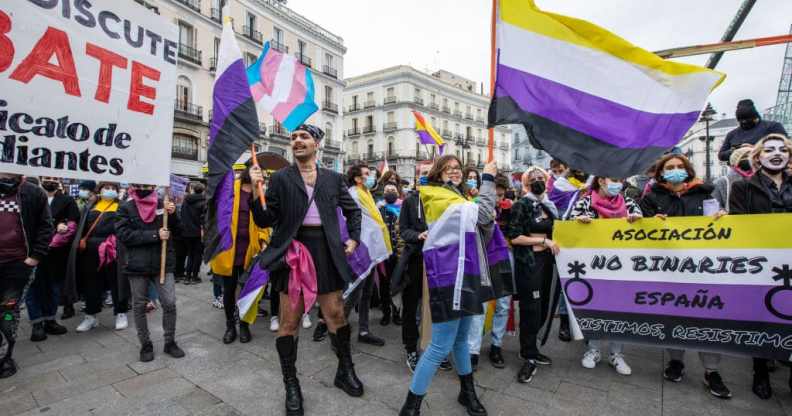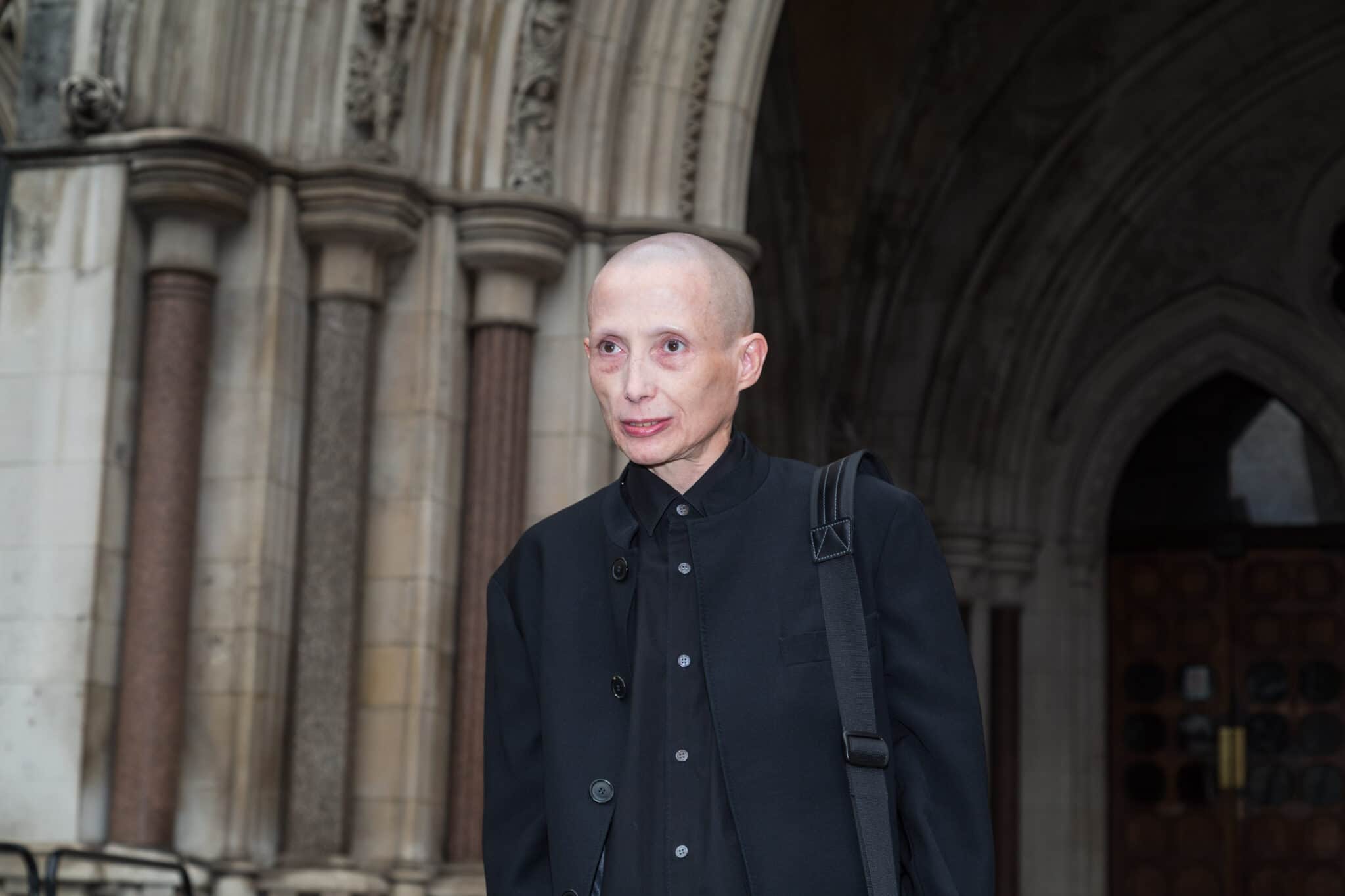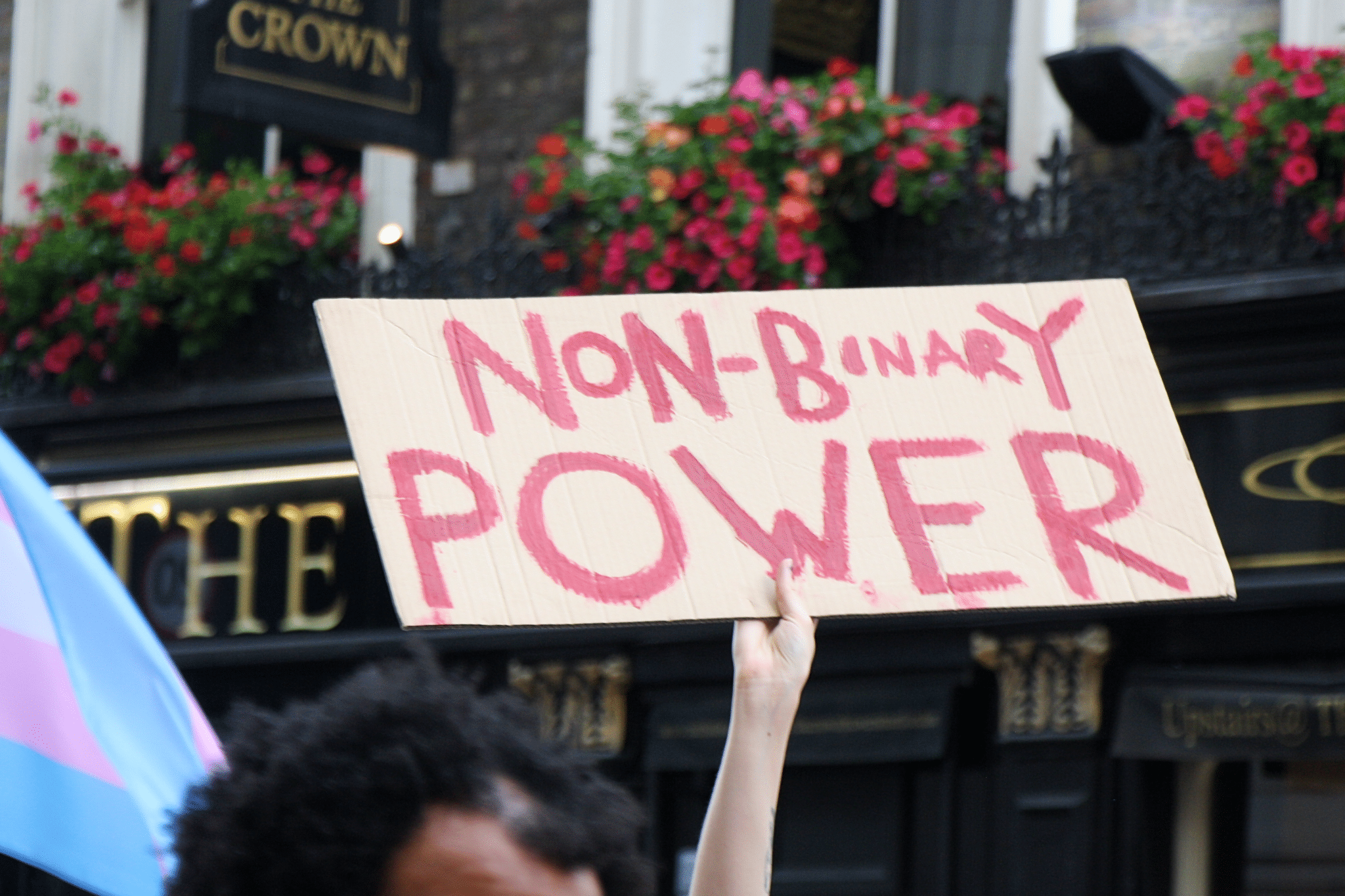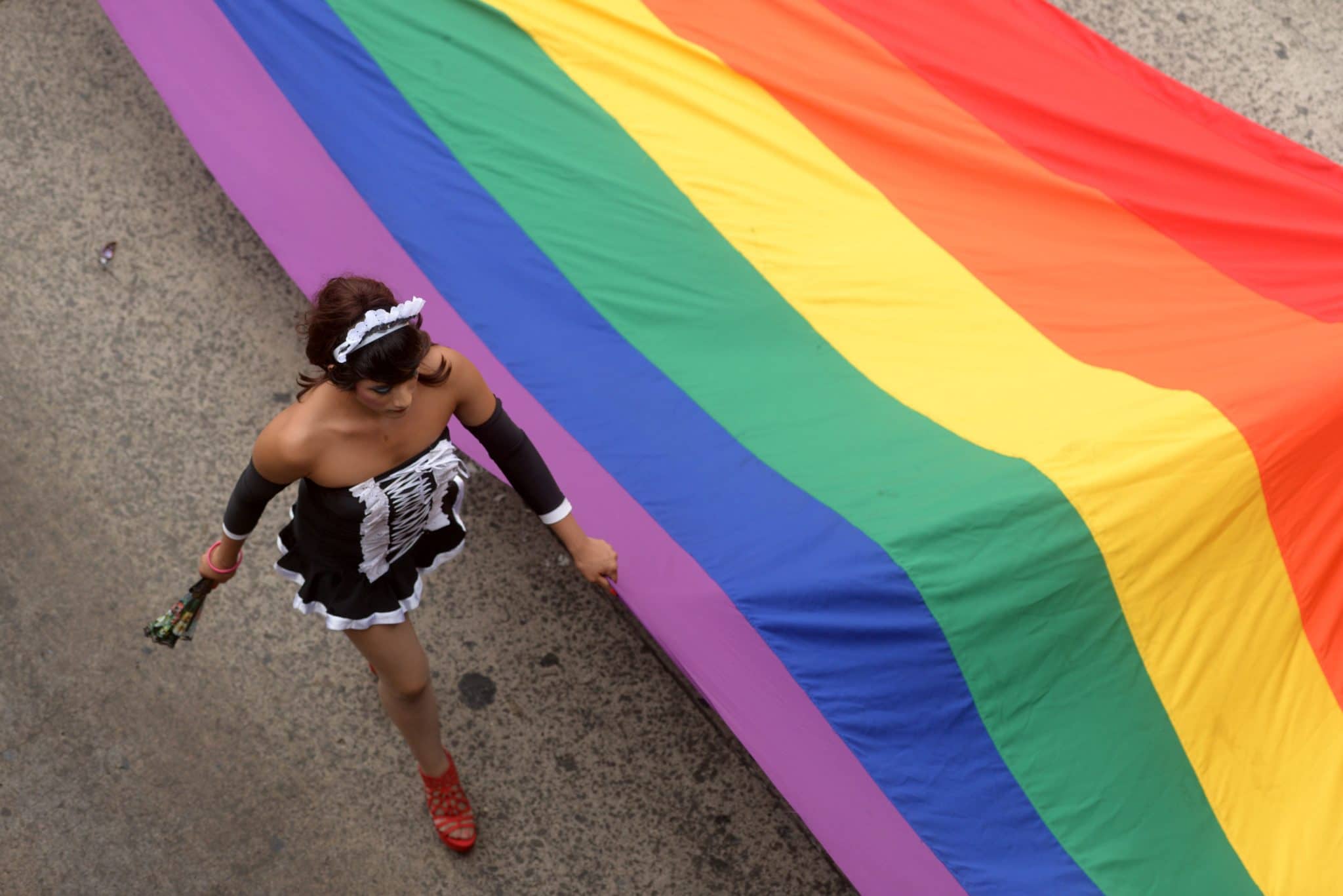Non-binary people ‘are being erased’ by UK’s cruel refusal to issue gender-neutral passports

Non-binary activists protest in Madrid in 2021. (Aldara Zarraoa/Getty Images)
Non-binary activists protest in Madrid in 2021. (Aldara Zarraoa/Getty Images)
Non-binary people in the UK say they “are being erased” by the government’s refusal to issue gender-neutral passports.
Denying non-binary citizens ‘X’ gender markers on British passports means they feel “non-existent”, like they “don’t count” and are being “othered”, while the absence of non-binary legal recognition “bolsters the feeling that the world thinks trans people are lying”, four non-binary people told PinkNews.
They were speaking after the Supreme Court unanimously dismissed an appeal, on 15 December, by non-gendered activist Christie Elan-Cane for the Home Office to provide ‘X’ gender markers on passports as well as ‘M’ and ‘F’.
Siding with the government, the judgment said that making ‘X’ gender markers available in the UK would have “adverse implications for the security aspects for the use of passports” and “result in substantial administrative costs”.
Ironically, the government is no stranger to spending vast sums on passports: The cost of introducing blue UK passports in the wake of Brexit is reportedly £290 million.
The “complicated and costly” arguments are wearily familair to non-binary people: this year, after more than 140,000 people signed a petition calling on the government to legally recognise non-binary identities, the Tories said that it would have too many “complex practical consequences“.
This was the same answer given in 2020 when Liz Truss scrapped reforms to the Gender Recognition Act.
Despite 58 per cent of respondents to the huge 2018 public consultation GRA reform saying the law should be changed to include non-binary people in legal gender recognition, “The government noted that there were complex practical consequences for other areas of the law, service provision and public life if provision were to be made for non-binary gender recognition in the GRA.”
What did Christie Elan-Cane ask the government for?
In Christie Elan-Cane’s case, the argument was for an ‘X’ marker, to indicate an unspecified or undisclosed gender, to be made available for British passport holders – available to anyone, including those whose gender identity is neither male nor female.
During the historic hearing in July, Supreme Court justices were told how passports with an ‘X’ gender marker have been available in multiple countries for decades, are “nothing controversial”, and that there is “no evidential basis” for the government’s claim that ‘X’ gender markers in passports would have an “adverse impact on the state”.
Government lawyers told the court that implementing ‘X’ gender markers in passports would be “extremely difficult”.
Speaking after the Supreme Court dismissed per case, Elan-Cane told PinkNews that the ruling was an “abomination”, and added: “Justice was not served today.”

Non-gendered campaigner Christie Elan-Cane at the High Court in 2017. (Paul Davey / Barcroft Media via Getty Images)
Non-binary people ‘erased’ by lack of gender-neutral passports
The consequences of not allowing ‘X’ gender markers in passports or extending gender recognition laws to include non-binary identities are felt by the hundreds of thousands of people in the UK who, according to the government’s own estimates, are non-binary.
“It feels like in the eyes of the law, in the medical community in the UK, I don’t exist,” says Blythe, a support worker for a mental-health charity. “There isn’t any space for me.”
Although MPs refer to non-binary people in speeches and committees, and the British Medical Association firmly backs legal self-identification for non-binary people, the lack of nationwide recognition for non-binary people means many feel similar to Blythe.

A placard reading “Non-binary power” at London Trans+ Pride, 2021. (Charlie Mathers/@charlie.mathers)
Fi, who works in an academic institution in the UK, also feels invisible. “A lot of people when they hear trans rights they think of trans women, and when people see me getting upset about transphobia they say ‘but you’re not trans’,” they told PinkNews. “I’m privileged, but people just don’t see me. It feels personal. There’s a feeling of visibility and being erased at the same time.”
And Elise, a PhD student living with chronic illness, says that the lack of legal recognition means “the way I interact with the world day-to-day, is a lie”.
“It feels like I’m having to go incognito if I put down female or show my passport. It feels like I’m pretending to be somebody – there’s a dissonance,” they say.
Why non-binary legal recognition and passports matter
Multiple countries around the world have one, or both, of the following: ‘X’ gender markers available for citizens in passports, travel documents, and ID documents; legal recognition of a third, non-binary or non-specified gender, including an ‘X’ or similar option for birth certificates.
They include Australia, New Zealand, Malta, Argentina, Canada, Bangladesh, Pakistan, Nepal, India, Uruguay, Iceland, the US, Austria, Denmark, Germany, the Netherlands and Taiwan. In some places, this has existed for years – without any adverse impact or upending of national security protocols.
Yet in the UK, the government is firmly resistant to this progress. Robyn, a non-binary writer who specialises in trans identities and national security, explains that the main issue when it comes to non-binary recognition and national security relates to non-binary asylum seekers.
“Asylum policies around the world only work in a very binary way,” they say. “There’s no protection for people who are trans and non-binary. If you’re medically transitioning when you arrive as a refugee that’s not supported; there’s no legal recognition. You either risk danger to yourself or are forced into the closet. If you do manage to get asylum you then have to restart the whole healthcare process again.
“Transphobia is so prevalent in the media, in academia, in the The Guardian and the The Times – it makes a scary environment for people coming here to escape lives where they are in danger.”

Revelers take part in the Gay Pride Parade in San Salvador, El Salvador, on June 25, 2016. (MARVIN RECINOS/AFP via Getty Images)
Last year, a non-binary person from El Salvador was granted asylum in the UK – with the judge ruling, for the first time, that being non-binary can be grounds for asylum. The case was heard just weeks after another landmark ruling for non-binary rights, which saw an employment tribunal confirm that non-binary employees are protected from discrimination by equalities law.
But these court rulings are not the same as legal recognition, which would provide “basic understanding of the fact that we do exist”, Robyn says.
“The moment that people start to recognise us that’s when things will really start to ramp up,” they add. “From the basic recognition things can start to get significantly better for the entire trans community.
“It’s a small step that helps everyone so that the basics are in place for everyone, not just a few people.”

